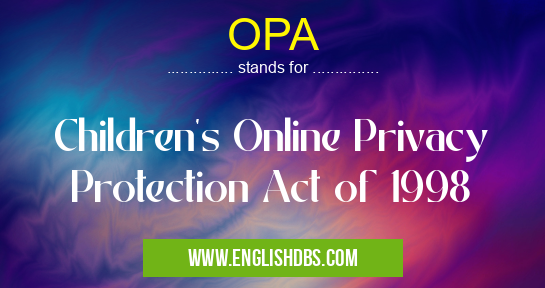What does OPA mean in LAW & LEGAL
The Children's Online Privacy Protection Act (COPPA) of 1998 is an important piece of legislation in the United States that sets out specific requirements for websites and online services when it comes to collecting and using information from children under the age of 13. It is designed to ensure that those companies who interact with kids are held to a high standard and protect their privacy rights.

OPA meaning in Law & Legal in Governmental
OPA mostly used in an acronym Law & Legal in Category Governmental that means Children's Online Privacy Protection Act of 1998
Shorthand: OPA,
Full Form: Children's Online Privacy Protection Act of 1998
For more information of "Children's Online Privacy Protection Act of 1998", see the section below.
What Is COPPA
COPPA requires website operators, including mobile applications, to get parental consent before they collect, use, or disclose personal information from children under the age of 13. The Act also requires website operators to post a clear and comprehensive privacy policy and provide parents with direct notice of their practices. Generally speaking, the purpose of this legislation is to guarantee that parents have control over what data is collected from their children online.
How Does COPPA Work
Under COPPA, any website or online service directed toward children must obtain parental consent before collecting any personal information from them. Moreover, websites and online services must provide clear explanations about how they collect, use, store, and share personal information from kids under 13 as well as give parents the ability to review any collected information and delete it upon request. Furthermore, these organisations must take reasonable steps to ensure that third-party vendors who handle such data adhere to similar procedures.
Essential Questions and Answers on Children's Online Privacy Protection Act of 1998 in "GOVERNMENTAL»LAW"
What is the Children's Online Privacy Protection Act of 1998?
The Children's Online Privacy Protection Act (COPPA) was enacted by Congress in 1998 to protect the privacy of children under 13 years of age and covers the collection, use, and disclosure of personal information from children on websites.
How does COPPA affect my child's online activities?
COPPA regulates certain types of data collection and prohibits companies from collecting or using a child's personal information without parental permission. It also requires companies to provide clear notice about their data practices and obtain verifiable parental consent before collecting or using any personal information from children under 13.
Does COPPA apply to all online services?
COPPA applies to all online services targeting children under 13 in the US, including social networks, mobile apps, and websites that are “directed to†children. It doesn't apply to general audiences that may have users who happen to be under 13 years old such as most news or entertainment sites.
Are there exceptions for educational websites?
Yes. COPPA has an exemption for educational sites, which are defined as those whose primary purpose is teaching or instructing a child using materials that are actual school work or related activities and content presented in an educational setting.
What kind of data can be collected under COPPA?
Under COPPA, data potentially covered by the rule include full name, address, phone number email address, photos, social security numbers as well as any other persistent identifier collected online (such as IP addresses).
Do parents need to approve every bit of data collected?
No. Parents only need to give their consent before any personal information from a child is collected and used by a website or app provider. This includes prior consent for any further uses beyond what was initially specified at the time of disclosure. Parents also have access rights over their child's data after it is collected by the app or website provider.
Are there penalties for breaching the rules set out in COPPA?
Yes - companies found in breach of COPPA can face civil penalties up to $40k per violation subject to FTC enforcement action upon discovery of such violations on behalf of their users who are under 13 years old.
What should I do if I think my child's privacy has been violated?
You should contact either your state attorney general or the FTC directly with evidence detailing how you believe your child's privacy rights were violated in order for them to investigate your claims further.
Final Words:
COPPA provides an important layer of protection for young people when they are accessing websites and digital services online. It helps guarantee that companies who handle personal information concerning minors take seriously their responsibility in safeguarding such data by providing sufficient transparency and taking all necessary measures therein.
OPA also stands for: |
|
| All stands for OPA |
